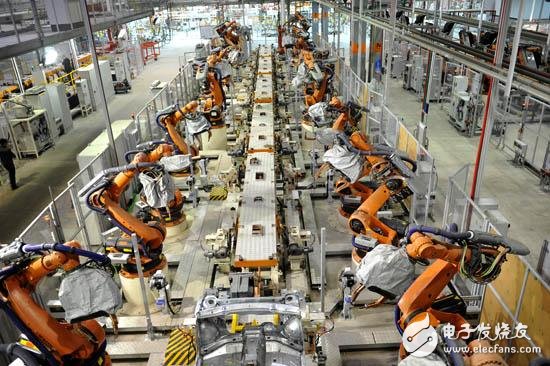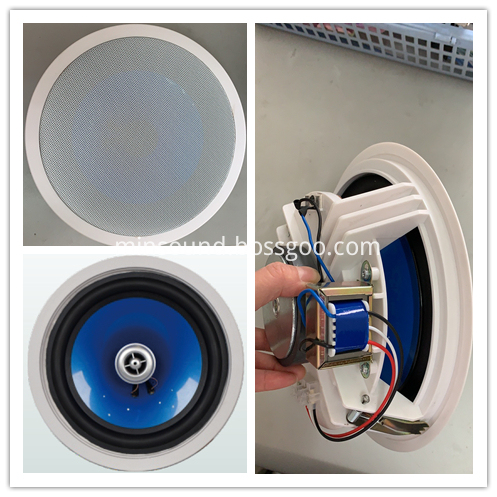KUKA CEO TIll Reuter came to Shanghai with his robot. The next day, the robots were brought to the China Home Appliances and Consumer Electronics Show (AWE2017). Now, Germany's well-known robot company KUKA is already a member of the Midea Group.
At the AWE show, Jiuyang's intelligent cooking robot is ready to be in place in the exhibition hall not far from the KUKA robot. Pour the material into the pot, press the stir button, and the robot handle will automatically stir fry.
The robot industry mainly includes industrial robots and home service robots. In the context of the transformation and upgrading of the home appliance industry, the involvement of China's home appliance companies in these two types of robots has also deepened. However, how to truly master the core technology of industrial robots, enhance competitiveness, and how to develop a truly practical service robot is a hurdle in front of Chinese home appliance companies.

Foreign giants master key technologies
As one of the most popular hotspots in the world, robots are indispensable "guests" for every technology exhibition. This year's AWE is no exception.
At the KUKA booth, a robot that can play basketball attracts attention. The robot arm flexes flexibly and a basketball is accurately thrown into the basket.
In addition to basketball, KUKA robots are also table tennis masters. There is a wide video about KUKA on the Internet. In this video, KUKA Robots battles World Table Tennis Champion Bol, and in another form, it has staged a "human-machine war."
At the beginning of January this year, Midea Group officially completed the delivery of KUKA Robotics. After the completion of the acquisition and delivery, Midea Group held a total of 37.605 million shares of KUKA Group through the wholly-owned overseas subsidiary MECCA, accounting for the issued share capital of KUKA Group. 94.55%. This is also one of the largest overseas acquisitions of Chinese companies in recent years.
"The United States opened a door to China to KUKA." In an interview with reporters, TIll Reuter evaluated the cooperation between KUKA and the United States.
From the outside world, Midea’s acquisition of KUKA is a cost-effective deal. This acquisition has laid the foundation for Midea’s transformation from Chinese home appliance companies to world technology groups. At a press conference held by the US group on March 8, Midea’s position on itself was also a “global technology groupâ€.
TIll Reuter said that whether it is on the management side or the technical side, Midea gives KUKA full respect and ensures the independence of KUKA in business operations. As the main body, KUKA will help Midea Group to fully deploy in the fields of robotic ontology production, industrial automation solutions, system integration, and intelligent logistics.
In fact, in addition to the United States, Gree Electric also appeared in a variety of robots in early March.
At present, the traditional home appliance industry has entered a bottleneck period of development, and the market is growing slowly. Han Run, vice president and director of Jiuyang Co., also admitted that the challenges and opportunities of the domestic appliance industry are coexisting. On the one hand, due to the international situation, the macroeconomic environment, and rising costs of raw materials, logistics, and manpower, the pressure on production and operation of enterprises is rising. On the other hand, with the upgrading of consumption and the changes of consumer groups, personalized and high-quality home appliances are more favored by the market.
For many home appliance companies, getting involved in industrial robots is an important direction for expanding development space. According to the International Robot Federation, in 2015, there were 36 robots per 10,000 workers in China. By 2020, this number will rise to 150, and the global automation density ranking will increase from 20 to the top 10.
However, in the process of entering the robot field, Chinese home appliance companies are not able to circumvent the threshold of core technology in both M&A and independent research and development. From the current point of view, the key technology of the robot is still in the hands of foreign giants.
Zhou Chaosen, an engineer of the Guangzhou Mechanical Institute and deputy secretary-general of the Guangzhou Industrial Robot Manufacturing and Application Industry Alliance, said in an interview that the key components of industrial robots include three, namely reducer, motor and controller. Among them, the components of high-end reducer are all monopolized by foreign brands. The performance and stability of domestic enterprises are different from those of foreign countries. Although the technology of motor and controller is more mature, there is a gap between them and foreign countries.
Service robot cost-effective to be improved
Service robots are closer to consumers than industrial robots. On March 9th, at the AWE exhibition, Jiuyang staff showed their robots that can be used for cooking: just wash the dishes, oil and accessories to be cooked in advance, then pour them into the pot, then press Under the button of cooking, cover the lid, the robot replaces the artificial stir fry by rotating continuously, so that the dish in the pot is heated. After 10 minutes, the robot can automatically cook the dish.
However, from the exhibition site, the variety of service robots is not rich enough, and the cost performance needs to be improved.
The reporter saw at least four companies on display at the scene to show their own sweeping robot products, the price is about 3,000 yuan. The reporter also saw a window cleaning robot. Two suction cups with fabrics are attached to the glass, and the robot can scrub the glass while running. The robot manufacturer, Shanxi Jiashida Robotics Co., Ltd., said that their window cleaning robots were acquired during the double 11 period last year. A good sales.
However, according to the reporter, no matter whether it is a sweeping robot or a window cleaning robot, there are not many people who actually enter the family. According to industry observer Hong Shibin, on the one hand, the price of these service robots is not cheap. It costs thousands of dollars to buy a sweeping device. Some families may think that it is not cost-effective. On the other hand, how are the cleaning effects of these robots? There is no bottom in the psychology.
The service robot itself has a single category and it has to be mentioned. In addition to sweeping the floor and scrubbing the glass, the reporter failed to see other robotic products at the show.
Hong Shibin believes that the development prospects of the robot industry are certainly good, but in the process of development, there are many difficulties that need to be overcome.
Hot selling Minsound series ceiling speakers produce clear and loud sound of high-fidelity in a wide coverage.
We have different models of ceiling speakers with different power ,speaker unit and size,
It is ideal choice for home theatre, meeting room, shopping mall, lecture room,classroom and so on.
Ceiling Speaker,Ceiling Loudspeaker,in Ceiling Speaker,in Ceiling Speakers,Ceiling Mount Speakers
Taixing Minsheng Electronic Co.,Ltd. , https://www.ms-speakers.com